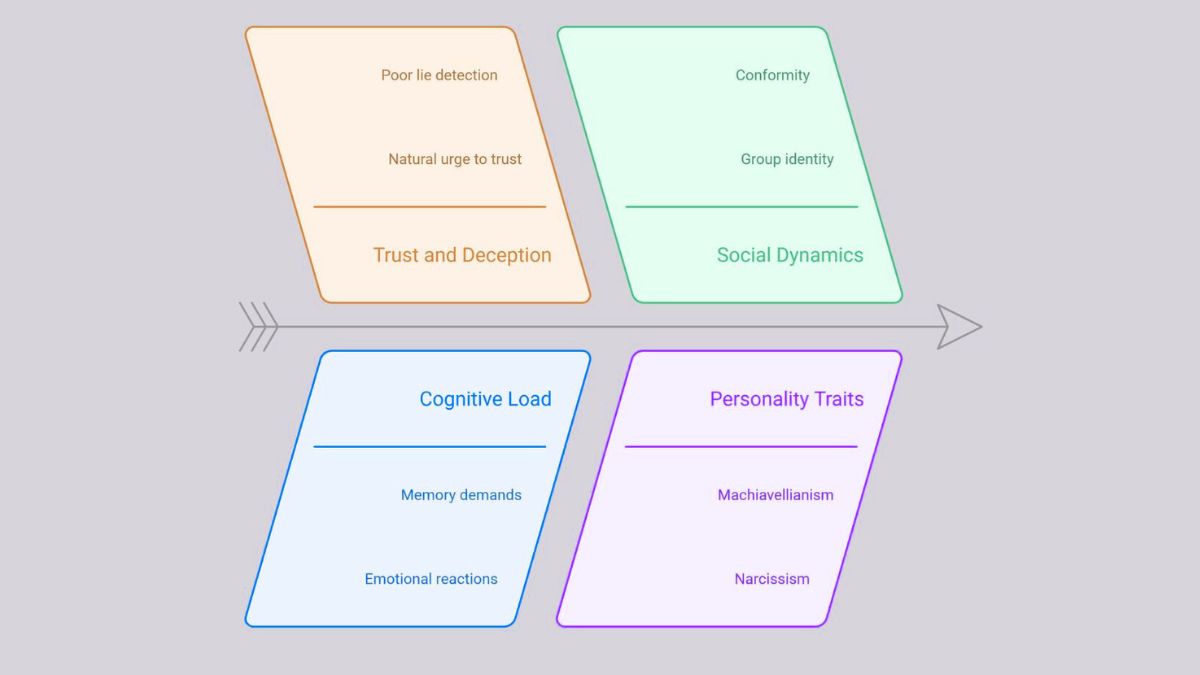The Psychology of The Traitors Explained

David Webb (Founder and Editor of All-About-Psychology.com)
My son Luca recently introduced me to The Traitors, and we’re currently watching The Celebrity Traitors, the spin-off of the hit reality series. I’d never seen the show before and had no idea what an international phenomenon it had become. Within minutes, I was hooked. The format is packed with tension, strategy, and social dynamics that make it a treasure trove of psychological interest.
If, like me, you’ve been hiding under a rock and have no idea what all the fuss is about, The Traitors (also known as The Traitors UK) is a British reality television series broadcast on BBC One, based on the Dutch show De Verraders. It premiered back in November 2022 and has evolved into a global success, inspiring adaptations and drawing devoted audiences across Europe, North America, and beyond.
What makes The Traitors so remarkable is not just its reach but the way it taps into something compelling, namely the fascinating dynamics of human deception, trust, and group psychology. It’s reality television at its most revealing, a social experiment that exposes how people navigate suspicion, loyalty, and the fine line between truth and deceit.
Inside the Game: How The Traitors Works
The Traitors is a reality competition that mixes teamwork with deception and psychological strategy.
A group of contestants are brought together (usually in a castle) and take part in daily missions to build up a prize fund. Most players are known as Faithfuls, whose goal is to identify and eliminate the hidden Traitors among them before the game ends.
At the start of the show, a few contestants are secretly chosen as Traitors. The Faithfuls don’t know who they are. Each night, the Traitors secretly choose one Faithful to “murder,” removing that person from the game.
Every day, the remaining players gather at the round table to discuss their suspicions and vote to banish one person, hoping to eliminate a Traitor. If they’re wrong, they lose another Faithful.
This cycle of missions, murders, and banishments continues until the end of the game. If all the Traitors are exposed and banished, the Faithfuls share the prize money. If even one Traitor remains, that person or team of Traitors takes the entire pot.
The Psychology of The Traitors: Themes Worth Exploring
Beneath the drama and suspense lies a complex interplay of psychological forces that reveal how humans think, feel, and behave when trust and survival are at stake.
Trust, deception, and the illusion of honesty
The game hinges on people’s natural urge to trust and their poor ability to detect lies. Viewers watch in real time as contestants misread confidence for honesty, or friendliness for integrity. The Faithfuls repeatedly fall into the trap of assuming that a trustworthy personality and a “Faithful” role must go hand in hand, illustrating how easily moral character and situational behavior get confused.
Cognitive load and the strain of deception
Lying convincingly takes effort. Traitors must track their own stories, remember what they have said to whom, and stay consistent under pressure, a task that places a heavy demand on working memory and self-control. Meanwhile, Faithfuls also carry a mental burden, juggling suspicion, emotional reactions, and limited information to make high-stakes judgments.
Impression management and self-presentation
Contestants arrive knowing they will be judged within seconds. Many deliberately adjust how they present themselves, hiding status, playing down intelligence, or adopting alternative personas to avoid appearing threatening. This is a live demonstration of impression management, where people shape others’ perceptions to protect themselves from exclusion or attack.
Group identity and social bonding
Isolation from the outside world heightens emotional intensity and accelerates group bonding. Within the castle walls, alliances form quickly, mirroring real-life dynamics of belonging and loyalty. The pressure to be accepted can override logic, leading players to defend allies or reject outsiders for reasons rooted more in emotion than evidence.
Conformity and groupthink
At the round table, decisions often follow the loudest or most confident voice rather than sound reasoning. Once an opinion gathers support, others fall into line, creating a domino effect of consensus. The result highlights the classic social psychology findings on conformity, groupthink, and the dangers of collective decision-making under stress.
Emotional reasoning and bias
Without hard evidence, players rely heavily on intuition. Snap judgments, gut feelings, and subconscious biases guide their votes. This makes The Traitors a revealing case study in how stereotypes, implicit bias, and flawed logic shape human judgment, including biases related to gender, race, and perceived normality.
Influence and persuasion
Success often depends less on facts and more on social influence. Some contestants win trust by building small “in-groups,” while others rely on charisma or apparent expertise. The game shows how authority, confidence, and consensus can all manipulate perception, often leading people to believe what feels true rather than what is true.
The Dark Triad and personality dynamics
Traits linked with manipulation and emotional detachment such as Machiavellianism, narcissism, and psychopathy are advantageous for those playing as Traitors. These personalities are skilled at charm, strategic deceit, and calculated risk-taking. Yet they also highlight a psychological paradox: the qualities that bring short-term success in the game can lead to long-term emotional emptiness in life.
The moral psychology of winning and losing
The show raises deeper questions about morality and well-being. Winning through betrayal might look impressive on screen, but research and clinical insight suggest that chronic manipulation and mistrust can leave people lonely and disconnected.
Psychological resilience and coping under pressure
Both Faithfuls and Traitors must regulate stress and emotions in a high-stakes, constantly shifting environment. The need to stay calm, adapt quickly, and read others accurately mirrors the psychological skills useful in everyday life, from managing anxiety to navigating social uncertainty.
Real-world parallels and moral reflection
Perhaps the show’s greatest psychological appeal lies in its reflection of real social life. Workplaces, friendship groups, and institutions all contain hidden alliances, strategic self-presentation, and moral gray areas. The Traitors magnifies these tendencies, inviting viewers to reflect on their own biases, moral limits, and capacity for trust.

Why The Traitors Is a Goldmine for Psychological Exploration
This analysis has given me countless ideas for future articles on human behavior and the psychology behind how we think, feel, and relate to one another. The first piece I plan to write, inspired by The Traitors, will explore the question that host Claudia Winkleman posed to the contestants in the last episode I watched: “How on earth are you going to tell if someone is lying to you?”
Beyond sparking my personal curiosity, The Traitors also provides an excellent starting point for psychology students searching for a dissertation or research topic. From deception detection and group dynamics to trust, conformity, and cognitive bias, the show offers a ready-made laboratory of ideas for anyone interested in studying how people navigate truth and lies in social settings.
🚀 Want to get your brand, book, course, newsletter, podcast or website in front of a highly engaged psychology audience? I can help!
All-About-Psychology.com now offers advertising, sponsorship and content marketing opportunities across one of the web’s most trusted psychology platforms - visited over 1.2 million times a year and followed by over 1 million social media followers.
Whether you're a blogger, author, educator, startup, or organization in the psychology, mental health, or self-help space - this is your chance to leverage the massive reach of the All About Psychology website and social media channels.
🎯 Exclusive placement
🔗 High-authority backlink
👀 A loyal niche audience
Learn more and explore advertising and sponsorship options here: 👉 www.all-about-psychology.com/psychology-advertising.html

Know someone who would be interested in reading
The Psychology of The Traitors Explained.
Share This Page With Them.
Go From "The Psychology of The Traitors Explained" Back To The Home Page
